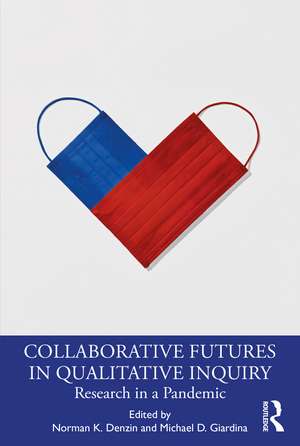Collaborative Futures in Qualitative Inquiry: Research in a Pandemic: International Congress of Qualitative Inquiry Series
Editat de Norman K. Denzin, Michael D. Giardinaen Limba Engleză Paperback – 4 mai 2021
Leading international scholars from the United States, Canada, Chile, New Zealand, Norway, and the United Kingdom wrestle with the changing dynamics of research in pandemic times. Collectively and collaboratively, contributors call for a critical, performative, social justice inquiry directed at the multiple crises of our historical present—a rethinking of where we have been, and, critically, where we are going. More specifically, contributors focus on such topics as: the emotional geographies of academic writing; assaults on science and truth; pedagogies of the imagination; indigenization and reconciliation; the search for our common humanity; and the relevance of qualitative inquiry in an era of big data and digital transformation.
Collaborative Futures in Qualitative Inquiry is a must-read for faculty and students alike who are interested in imagining new ways to collaborate, to engage in research and activism, and represent and intervene into social life in pandemic times.
| Toate formatele și edițiile | Preț | Express |
|---|---|---|
| Paperback (1) | 369.73 lei 6-8 săpt. | |
| Taylor & Francis – 4 mai 2021 | 369.73 lei 6-8 săpt. | |
| Hardback (1) | 997.27 lei 6-8 săpt. | |
| Taylor & Francis – 4 mai 2021 | 997.27 lei 6-8 săpt. |
Preț: 369.73 lei
Nou
Puncte Express: 555
Preț estimativ în valută:
70.76€ • 72.100$ • 59.89£
70.76€ • 72.100$ • 59.89£
Carte tipărită la comandă
Livrare economică 04-18 martie
Preluare comenzi: 021 569.72.76
Specificații
ISBN-13: 9780367723835
ISBN-10: 0367723832
Pagini: 172
Dimensiuni: 152 x 229 x 9 mm
Greutate: 0.45 kg
Ediția:1
Editura: Taylor & Francis
Colecția Routledge
Seria International Congress of Qualitative Inquiry Series
Locul publicării:Oxford, United Kingdom
ISBN-10: 0367723832
Pagini: 172
Dimensiuni: 152 x 229 x 9 mm
Greutate: 0.45 kg
Ediția:1
Editura: Taylor & Francis
Colecția Routledge
Seria International Congress of Qualitative Inquiry Series
Locul publicării:Oxford, United Kingdom
Public țintă
Postgraduate, Professional, and Undergraduate AdvancedCuprins
Introduction; Section I: Political Futures 1. The COVID-19 Pandemic is Exposing the Plague of Neoliberalism 2. Becoming Weary/Wary: Confecting Anew in a Fascist World; Section II: Performative Futures 3. Betweeners: Our Common Humanity in Repressive Times 4. The Emotional Geographies of Academic Writing: Writing as a Method of Survival 5. It is a Lonely Voice Between the Social Rebellion and the Pandemic 6. Whimsy, Ethnographic Writing, and the Everyday: Possibilities, Politics, Poetics; Section III: Global Futures 7. Still Stumbling toward Indigenization, Reconciliation, and Decolonization: We Acknowledge the land, Now What? 8. Slow-Motion Activism: Performing Impossible Futures 9. Big Data, Thick Data, Digital Transformation, and the Fourth Industrial Revolution: Why Qualitative Inquiry is More Relevant than Ever Coda. Sublime Resistance: Imagining Peace, Freedom, Health, Happiness, Community
Notă biografică
Norman K. Denzin is Distinguished Emeritus Professor of Communications, Sociology, and the Humanities at the University of Illinois, Urbana-Champaign. He is the Founder of the International Congress of Qualitative Inquiry.
Michael D. Giardina is Professor of Physical Culture and Qualitative Inquiry in the Department of Sport Management at Florida State University. He is the Director of the International Congress of Qualitative Inquiry.
Michael D. Giardina is Professor of Physical Culture and Qualitative Inquiry in the Department of Sport Management at Florida State University. He is the Director of the International Congress of Qualitative Inquiry.
Descriere
This book looks towards ways to navigate the uncertainties of conducting qualitative inquiry in a pandemic world - where travel isn't possible and the word 'collaborative' has taken on multiple new meanings, especially for researchers. It asks the fundamental question: is qualitative inquiry still relevant in this landscape?













